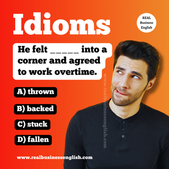Building Business English Communication Skills: Practice These Ten Common Linking Words
- Erin West

- Feb 13, 2024
- 2 min read
Updated: Feb 13, 2024

Effective business communication depends on various factors. The strategic use of linking words is one of them. Linking words bind ideas together and improve coherence in both writing and speech. In this article, we explore ten linking words commonly used in Business English.
To practice using linking words, download the worksheet at the end of the article.
1. As a result (of)
"As a result" is followed by a subject and a verb and introduces the consequence.
"As a result of something" is followed by a noun or noun phrase and introduces the cause.
The new marketing campaign was very successful. As a result, sales have increased.
As a result of the partnership with the leading supplier, we gained access to new markets.
2. In addition
"In addition" is used to add information.
We've secured four new clients. In addition, we've received positive feedback from our existing customers.
3. On the other hand
"On the other hand" is used to introduce a contrasting viewpoint. It presents an alternative perspective.
(On the one hand) The project requires considerable investment of resources. On the other hand, it will benefit our company in the long run.
4. Moreover
"Moreover" is used to introduce additional information or support a point already made.
She loves working flexible hours because it allows her to work whenever she wants. Moreover, a flexible schedule gives her the chance to spend more time with her children.
5. However
"However" presents an unexpected, even surprising comment/result/ condition/ outcome in relation to what was stated before.
Clients may find the price a bit too high. However, it includes a 2-year warranty policy and exceptional customer service.
6. Subsequently
"Subsequently" means "afterward" or "later in time."
She graduated from the university in 2022. Subsequently, she received a job offer from the ABC company.
7. Consequently
"Consequently" means "as a result."
The new strategy boosted our sales. Consequently, the company's profits increased.
8. Alternatively
"Alternatively" is used to introduce a suggestion that differs from what was just mentioned.
Alternatively, we could outsource our customer service to a third-party provider.
9. In conclusion
"In conclusion" indicates that the speaker is summarizing key points or making final remarks before finishing their speech.
In conclusion, AI applications have revolutionized customer service.
10. On the whole/ overall
"On the whole" and "overall" are used to indicate a general summary of something.
Overall, the new platform has improved communication.
%20(1).png)





















Comments